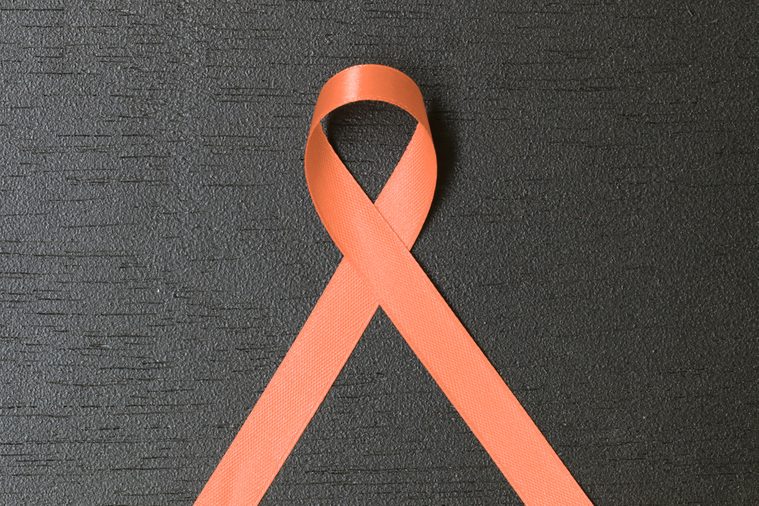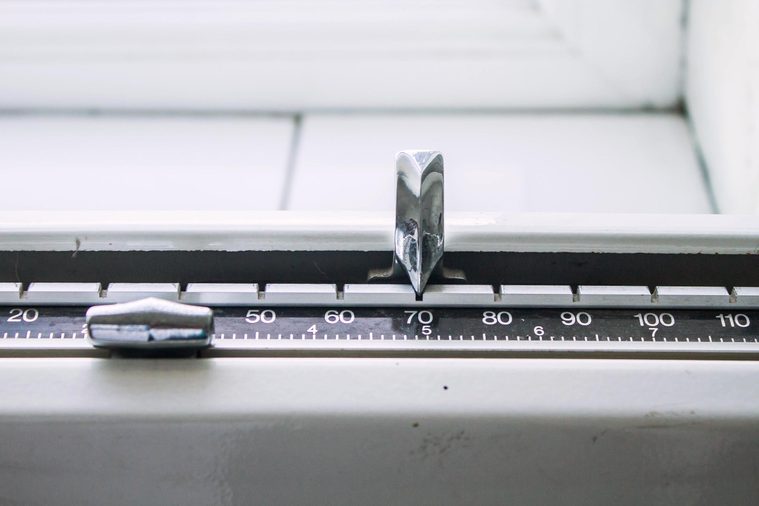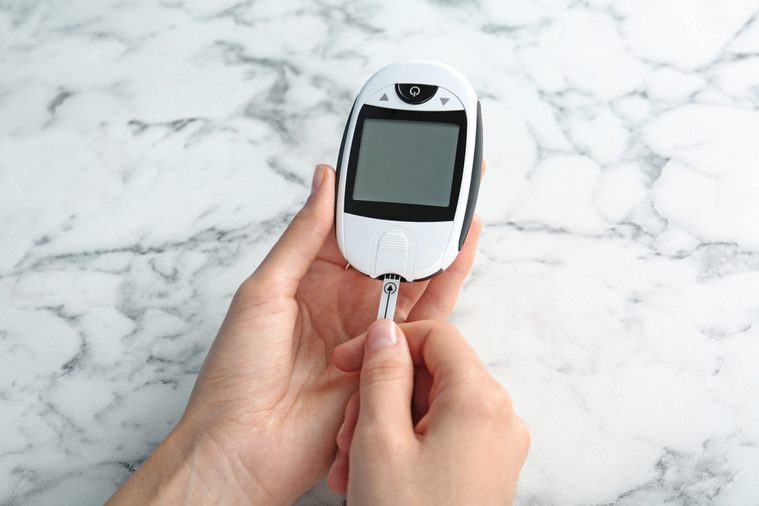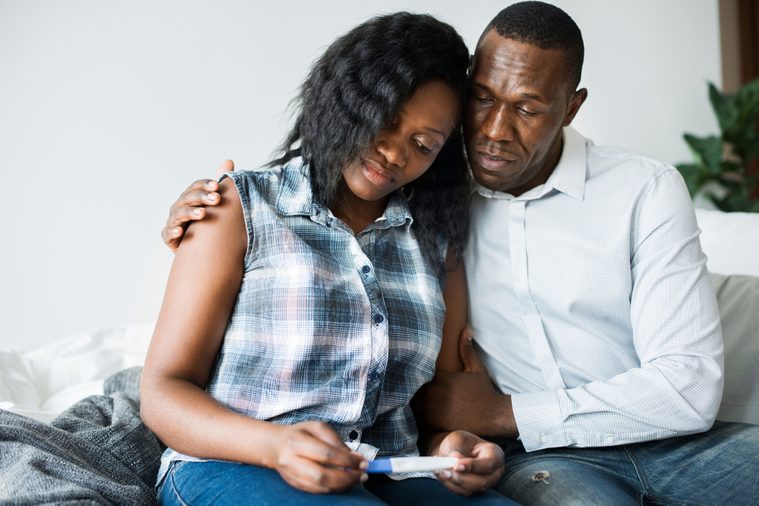
What is endometrial cancer?
Endometrial cancer falls under the umbrella category of uterine cancer. It develops in the lining of the uterus (the endometrium). Another, much rarer form, uterine sarcoma, begins in the muscle or other tissues in the uterus. About 63,230 new cases of uterine cancer will be diagnosed in 2018, according to the American Cancer Society (ACS), and about 11,350 women will die from these cancers during the same year. Uterine cancer is the fourth most common cancer in women in the United States, but it is usually treatable with surgery when caught early. Learn more about uterine cancer and its early symptoms.

Sign No. 1: Your weight
Endometrial cancer mainly strikes postmenopausal women. The average age of diagnosis is 60, but there has been a pronounced uptick of endometrial cancer diagnoses in younger women, says Shannon Westin, MD, a gynecologic oncologist at MD Anderson Cancer Center in Houston, Texas. This is likely due to the obesity epidemic. “Fat cells produce the female sex hormone estrogen, and all of this extra estrogen can build up in the body and increase endometrial cancer risk.”
The link between endometrial cancer and excess body fat is clear, but “women with endometrial cancer are much more likely to die from heart disease than cancer (if caught early) because the excess fat which causes endometrial cancer also causes heart disease,” says Donnica Moore, MD, a Far Hills, New Jersey–based women’s health expert and host of the podcast In the Ladies’ Room with Dr. Donnica. (Here are other health risks that happen after menopause.)

Sign No. 2: Your diabetes
Yes, diabetes travels with obesity, but it also increases the risk of developing endometrial cancer in its own right, Dr. Moore says. In fact, endometrial cancer may be as much as four times more common in women with diabetes, according to the ACS. This increase is likely due to higher-than-normal levels of the hormone insulin, which can stimulate cancer cells to grow. Getting your diabetes under tight control may help lower this risk. “Maintaining a healthy weight and regular exercise will help reduce the risk of endometrial cancer and likely have a positive effect on diabetes as well,” Dr. Moore says. (Here are some expert tips for exercising for diabetes.)
Following an ultra-low-carb diet may also help. Women with ovarian or endometrial cancer who ate an ultra-low-carb keto diet for 12 weeks lost more body fat and had lower insulin levels than women who followed the low-fat diet recommended by the ACS, according to a new study. “Compared to the diet recommended by the American Cancer Society, which is moderate- to high-carbohydrate, high-fiber, and low-fat, 12 weeks on a ketogenic diet, which is low-carbohydrate, high-fat, produced significantly lower levels of fat mass,” Kevin Fontaine, PhD, coauthor of the study and chair of the department of health behavior at the School of Public Health at the University of Alabama at Birmingham, said in a news release. (Here’s a keto diet menu to help get you started.)

Sign No. 3: Your family history
Lynch syndrome is a genetic condition that increases your risk of colon, endometrial, and other types of cancer. “If you have a family history of uterine or colon cancer, especially among younger family members, talk to your doctor about genetic testing for Lynch syndrome,” Dr. Westin says. Aggressive cancer screening and/or risk-reduction surgery may help turn the tables on these cancers if you have Lynch syndrome. (Check out what things your mother’s health says about you.)

Sign No. 4: Your fertility issues
The buildup of estrogen in the body is known to increase the risk of endometrial cancer, and it seems that infertility—but not its treatments—may also raise this risk, says Dr. Westin. “We think it is the lifetime exposure to estrogen and not having a break in estrogen during pregnancy that is responsible for this increased risk,” she says. Put another way: The more menstrual cycles you have, the greater your risk of developing this cancer. It is for similar reasons that using birth control pills lowers your endometrial cancer risk. (Don’t miss why you might want to switch from birth control pills to an IUD.)

Sign No. 5: Your HRT use
Taking estrogen alone (without progesterone) to alleviate some of the symptoms of menopause can boost the risk of endometrial cancer in women who still have a uterus. This is why a progestin is added to the regimen in these women, Dr. Moore says. Research in the journal Cancer Epidemiology suggests that endometrial cancer rates increased significantly from 2002 to 2009 after there was a dramatic drop in the use of such combination hormone replacement therapy (HRT) because of findings from the Women’s Health Initiative. The HRT arm of this large-scale study was stopped early when researchers noted that an increase in breast cancer (as well as heart disease, stroke, and blood clots) was seen among women taking estrogen and progesterone, Dr. Moore says. “The progestin component in HRT decreases endometrial cancer risk in overweight and obese women,” Dr. Moore says.

Sign No. 6: Postmenopausal bleeding
There are endometrial cancer symptoms, but many women may miss or dismiss them. “Any postmenopausal bleeding requires a workup,” Dr. Westin says. There are many noncancerous causes, but ruling out endometrial cancer should be a top priority. Heavy or irregular bleeding is also worth investigating in younger women, she says. “If there is a change in bleeding or a change in the amount or length of time you bleed, talk to your doctor,” she says. A biopsy of the endometrium is simple to perform, and it can rule out cancer and restore peace of mind.
Bear in mind that vaginal discharge—even without blood—may also be one of the endometrial cancer symptoms to watch for. “In about 10 percent of cases, the discharge associated with endometrial cancer is not bloody,” according to the ACS. Let your doctor know about any abnormal discharge. (Here’s what your vaginal discharge is trying to tell you.)

Sign No. 7: Bloating and pelvic pain
Premenopausal women may experience other endometrial cancer symptoms, too, says Dr. Moore. “Other symptoms may be subtle: bloating or feeling full faster than usual; changes in bowel or bladder habits; abdominal or pelvic pain,” Dr. Moore explains. It’s always better to be safe than sorry, so let your doctor know about any unusual symptoms, especially if they last for two weeks or longer. Next, check out these 50 signs that you’re healthy, according to every type of doctor.
